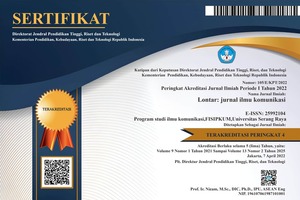Critical Discourse Analysis of Teun A. Van Dijk's model on @gerindra's TikTok Content in Gaining Gen Z Votes for Prabowo Subianto in the 2024 Election
DOI:
https://doi.org/10.30656/lontar.v12.i2.9300Keywords:
Principal contact for editorial correspondence, gerindraAbstract
This study aims to outline a critical discourse analysis of ten TikTok contents from @gerindra related to Prabowo Subianto in their efforts to capture Gen Z votes. The high usage of TikTok among Gen Z and its significant role in the 2024 elections, with voting proportions reaching 23%, has substantial implications. This research analyzes the interconnection of discourse and the role of TikTok in the effort to attract Gen Z votes. The study employs Teun A. Van Dijk's critical discourse analysis model, which includes text structure, social cognition, and social context. Data is collected through interviews and categorized based on the research subjects' statements. The subjects reported that in the 2024 elections, Gerindra must adapt to social media trends, particularly TikTok, in order to gain Gen Z support for Prabowo Subianto. This adaptation involves using a "serious yet relaxed" political communication style in their brief, light, and straightforward content. The study finds that Gerindra creates such content to present Prabowo as more humanistic, contrasting with his previously known strict and rigid image.
References
Beresforch Research. 2024. Age Range by Generation. https://www.beresfordresearch.com/age-range-by-generation/ (Diakses pada Jumat, 22 Maret 2024).
Eriyanto. 2015. Analisis Wacana (Pengantar Analisis Teks Media). Yogyakarta : LKIS Printing Cemerlang
Fitriana, R. A., Gani, E., & Ramadhan, S. (2019). Analisis Wacana Kritis Berita Online Kasus Penipuan Travel Umrah (Model Teun a. Van Dijk). BASINDO : Jurnal Kajian Bahasa, Sastra Indonesia, Dan Pembelajarannya, 3(1), 44–54. https://doi.org/10.17977/um007v3i12019p044
Hindarto, I. H. (2022). Tiktok and Political Communication of Youth: A Systematic Review. JRP (Jurnal Review Politik), 12(2), 146–176. https://doi.org/10.15642/jrp.2022.12.2.146-176
Hutauruk, Andrew Christoper, M., & Tranggono, D. (2024). Pengaruh Promosi Politik Partai Gerindra Di Media Sosial Tiktok Terhadap Sikap Mendukung Prabowo Subianto Dalam Pilpres 2024. Didiek Tranggono INNOVATIVE: Journal Of Social Science Research, 4(1), 1807–1815. https://j-innovative.org/index.php/Innovative%0APengaruh
Juditha, C., & Darmawan, J. J. (2019). Penggunaan Media Digital Dan Partisipasi Politik Generasi Milenial. 1–17.
Mudjiono, Yoyon. (2015). Ilmu Komunikasi. Surabaya : Jaudar Press.
Nasih, R. K., & Abboud, Z. A. (2020). A critical discourse analysis of two Iraqi politicians’ speeches in terms of Van Dijk’s socio- cognitive model. Journal of Basra Research for Human Sciences, 45(3), 1–16. https://www.iasj.net/iasj/article/197082
Nasional Alvara Research Center Melibatkan. 2023. Data Pengguna Internet di Indonesia. https://databoks.katadata.co.id/ (Diakses pada Minggu, 04 Agustus 2024).
Nofrizaldi, Arifianto, P. F., & Pertiwi, E. G. (2020). Analisis Tanda Visual Dalam Tagar Corona Art Museum. Jurnal Bahasa Rupa, 4(1), 42–49. https://doi.org/10.31598/bahasarupa.v4i1.614
Panggabean, Sarma. (2019). Diktat Pengantar Wacana. Medan : Universitas HKBP Nommensen.
Payuyasa, I. N. (2017). Analisis Wacana Krisis Model Van Dijk Dalam Program Acara Mata Najwa di Metro TV. Segara Widya Jurnal Hasil Penelitian, 5, 14–24.
Pratiwi, V. U., Nofrahadi, Pendri, A., Komalasari, D., & Sumarlam. (2020). News Text on Kompas.com Media of Covid-19 and the Underlying Conspiracy Theory: A Teun Van Dijk’s Critical Discourse Analysis. Budapest International Research and Critics Institute (BIRCI-Journal): Humanities and Social Sciences, 3(4), 3894–3903. https://doi.org/10.33258/birci.v3i4.1455
Prihartono, R., & Suharyo. (2022). Analisis Wacana Kritis Model Teun A. Van Dijk dalam “#Debat Keren Papua-Budiman Sudjatmiko vs Dandhy Laksono†(Kajian Analisis Wacana Kritis). Jurnal Wicara, 1(2), 90–96. https://ejournal2.undip.ac.id/index.php/wicara/article/view/16367
Ramanathan, R., & Hoon, T. B. (2015). Application of Critical Discourse Analysis in Media Discourse Studies. 3L: Southeast Asian Journal of English Language Studies, 21(2), 57–68. /citations?view_op=view_citation&continue=/scholar%3Fhl%3Den%26start%3D40%26as_sdt%3D0,5%26scilib%3D1&citilm=1&citation_for_view=OOHtgQUAAAAJ:u-x6o8ySG0sC&hl=en&oi=p
Rosida, S. (2021). Hashtag # Ghosting Sebagai Representasi Konten Tiktok : Analisis Wacana Kritis Teun A. Van Dijk. Jurnal Ilmu Komunikasi, 218–230. https://jurnal.uns.ac.id/prosidingsemantiks/article/download/53005/32915
Sajjad, F. (2015). A Critical Discourse Analysis of Barack Hussein Obama’s Political Speeches on the Middle East and the Muslim World. International Journal of Linguistics, 7(1), 1. https://doi.org/10.5296/ijl.v7i1.6856
Susanto, R. D., & Irwansyah. (2021). Media Sosial, Demokrasi, dan Penyampaian Pendapat Politik Milenial Di Era Pasca-Reformasi. LONTAR: Jurnal Ilmu Komunikasi, 9(1), 65–77. https://doi.org/10.30656/lontar.v9i1.3249
Wiedmer, T. (2015). Generations do differ: Best practices in leading traditionalists, boomers, and generations X, Y, and Z. Delta Kappa Gamma Bulletin. Vol 82(1), hlm. 51.
Zulmi, F. (2017). Keberpihakan Media Terhadap Isu Pelestarian Lingkungan Hidup. Jurnal KATA, 1(2), 101. https://doi.org/10.22216/jk.v1i2.2138
Downloads
Published
Issue
Section
License

This work is licensed under a Creative Commons Attribution-ShareAlike 4.0 International License.
By submitting an article to the journal, the author(s) agree to transfer the published article's copyright to the journal, which will act as the publisher. This means the journal will have the right to publish the article in various forms, including reprints. The journal will maintain the publishing rights to the published articles.
In line with the license, authors and third parties (readers, researchers, and others) are allowed to share and adapt the material. In addition, the material must be given appropriate credit, provided with a link to the license, and indicated if changes were made. If authors remix, transform, or build upon the material, authors must distribute their contributions under the same license as the original.





